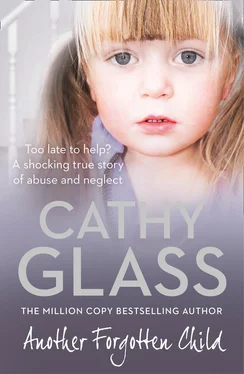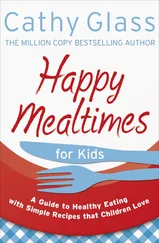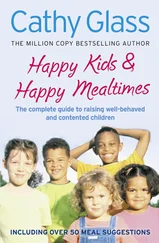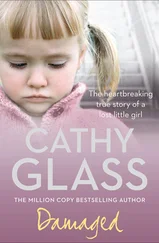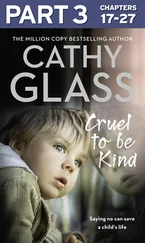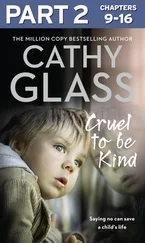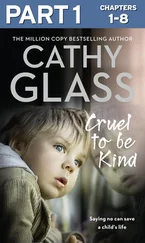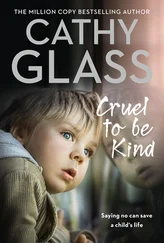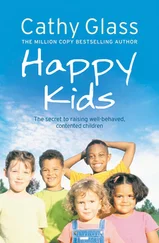‘I’m sure your mother will be very pleased,’ I said, turning her threat into a positive.
‘No she won’t,’ Aimee said. ‘She’ll report you.’ Which I ignored.
I now explained to Aimee that I wanted her to get dressed as quickly as she could and then come down for breakfast. ‘I need you downstairs by seven fifteen,’ I said, nodding at the clock on the wall. Aimee stared blankly at the clock. ‘When the big hand is here,’ I said, pointing to the three. ‘It’s five past seven now, so you have ten minutes to get dressed, which is plenty of time. What would you like for your breakfast?’
‘Biscuits.’
‘Biscuits are bad for your teeth. Toast or cereal?’
‘What’s cereal?’
‘We have cornflakes, wheat flakes, Rice Krispies or porridge.’
‘Toast.’
‘What would you like on your toast? Marmite, jam, honey or marmalade?’
‘Nothing.’
‘Sure?’
Aimee nodded.
Leaving Aimee to dress, I went downstairs and into the kitchen, where I made coffee for myself, and toast for Aimee and me. Paula and Lucy would make their own breakfasts when they came down. I lightly buttered the toast and added marmalade to mine; then I cut Aimee’s toast in half and half again so that it was easier for her to eat. Setting the plates on the table, I called upstairs to Aimee that breakfast was ready. To her credit a minute later she appeared, dressed in her old but now clean clothes. The joggers were far too small, as was her jumper, and her toes poked out of the holes in her socks, but all that would change once we’d bought her new clothes.
‘Well done,’ I said with a smile. ‘You dressed yourself very well.’ I showed Aimee to her place at the table, where her toast was waiting. ‘What would you like to drink?’ I asked. ‘Milk, juice or water?’
‘Water,’ Aimee said, sitting on the chair but too far from the table. I made a move to help her ease the chair under the table but she roughly pushed my hand away. ‘I can do it,’ she snapped.
‘All right, love, but don’t be rude. There are nice ways of saying things without being aggressive.’
‘I talk to me mum and dad like that,’ Aimee said, as though that justified her disrespect.
‘I don’t doubt it, love, but you shouldn’t. And you certainly won’t be talking to me like that.’ I said it kindly but firmly so that Aimee could see that I meant it. Teaching a child to show respect to others is crucial in putting them on the road to achieving socially acceptable and good behaviour. ‘Also, love, if you want to make friends you will need to speak to the children at school nicely too.’ Obvious to children who have been correctly brought up but not to a child from a dysfunctional background.
Aimee looked at me but didn’t say anything and I smiled again. Jumping her chair under the table until she was close enough, she took a bite of her toast and spat it out. ‘That’s disgusting,’ she cried.
‘It’s toast, as you asked,’ I said.
‘It’s got slimy stuff on it,’ Aimee said, wiping her mouth on the sleeve of her clean jumper.
‘I put a little butter on it,’ I said. ‘That’s all.’
‘What’s butter?’ Aimee asked.
I now took the butter from the fridge and showed her. She shrugged, indicating she’d never seen butter before. ‘Perhaps you had spread at home?’ I suggested.
Returning the butter to the fridge, I took out the tub of butter substitute and showed her, but Aimee shook her head. ‘We didn’t have that. I want me toast like I make it at home.’
‘All right. Tell me how you made it and I’ll do the same.’
Aimee turned to look at me and then, using her hand to gesticulate, explained: ‘I get the bread from the packet and I scratch off the green bits. That’s mould. Then I put the bread in the toaster and later it goes pop! It’s ready then. It’s hot, but it don’t have slimy stuff on it. Our toaster don’t do that. The man next door gave us the toaster. So I take me toast to the living room and I switch on the telly, only I have to have the sound on low because Mum is asleep on the mattress, and she gets angry if I wake her. Then I sit on the floor and eat me toast. I get toast and biscuits whenever I want.’
What a morning routine, I thought! I could picture Aimee waking in the morning beside her mother on the filthy mattress on the floor, then slipping out so she didn’t wake her mother, and making toast from rotting bread, which she ate dry because there was nothing to put on it. Compare Aimee, I thought, with a child from a good home. A chasm of neglect lay between them.
I made Aimee another slice of toast and gave it to her dry with the glass of water she’d asked for, but I knew I should start introducing new foods into her diet as soon as possible. She was pale, her skin was dull and her movements were lethargic, which made me suspect she might be mineral and vitamin deficient. All children who come into foster care have a medical and I would raise my concerns with the paediatrician when we saw her, and while I couldn’t give Aimee a vitamin supplement without the doctor’s or her parents’ consent, I could improve her diet.
Paula and Lucy came down to breakfast as Aimee finished eating hers.
‘Feeling better?’ Lucy asked, taking a bowl for her cereal from the cupboard.
‘No,’ Aimee scowled.
‘What’s the matter?’ Paula asked, joining Aimee at the table.
Aimee looked at the girls for a moment, then at me, and her face crumpled. ‘I want me mum,’ she cried, and burst into tears.
‘Oh, love,’ I said, immediately going to her. ‘Please don’t upset yourself. You’ll see her soon.’ I went to put my arms around her, wanting to hold and comfort her, but she drew back, so I settled for laying my hand on her arm and standing close to her.
I saw Paula’s eyes mist as Aimee sat at the table with her head in her hands and cried. ‘I want me mum. Please take me to my mum.’ For like most children, no matter how bad it has been at home, Aimee missed her mother, with whom she’d been all her life.
‘You’ll see her tonight,’ I reassured her, ‘straight after school.’
‘Don’t cry,’ Paula said, her voice faltering. ‘We’ll look after you.’
‘Better than your mother did,’ Lucy added under her breath. I frowned at her, warning her not to say any more.
‘Why can’t I see me mum now?’ Aimee asked, raising her tear-stained face. She looked so sad.
‘Because your social worker has arranged for you to see your mum tonight,’ I said. ‘And we have to do what your social worker says.’
‘Me mum didn’t do what the social worker said,’ Aimee said, oblivious to the fact that had she it would have probably helped them both.
‘I know it’s difficult to begin with,’ Lucy said, going round to stand at the other side of Aimee. ‘But it will get easier, I promise you. And doesn’t your hair feel better already? No more itchy-coos.’ Lucy lightly tickled the back of Aimee’s neck, which made Aimee laugh.
‘Good girl, let’s wipe your eyes,’ I said. I fetched a tissue from the box and went to wipe Aimee’s eyes, but she snatched the tissue from my hand and wiped them herself. Children who have been badly neglected are often very self-sufficient; they’ve had to be in order to survive.
Chapter Seven Chapter Seven: Should Have Done More Chapter Eight: Meeting Susan Chapter Nine: ‘He’s Horrible’ Chapter Ten: Poor Role Models Chapter Eleven: The Phone Call Chapter Twelve: Craig Chapter Thirteen: More Trouble Chapter Fourteen: Keep Asking Chapter Fifteen: Quiet and Withdrawn Chapter Sixteen: Serious Allegation Chapter Seventeen: Problem Family Chapter Eighteen: Flashback Chapter Nineteen: Hatchet Chapter Twenty: ‘Father Christmas Didn’t Come to My House’ Chapter Twenty-One: Going for Gold Chapter Twenty-Two: Perfect Christmas Chapter Twenty-Three: A New Year Chapter Twenty-Four: Jason Chapter Twenty-Five: A Winner Now Chapter Twenty-Six: Progress Chapter Twenty-Seven: A Chance Meeting Chapter Twenty-Eight: Peter Rabbit Chapter Twenty-Nine: The Visit Chapter Thirty: An Incredible Family Epilogue Acknowledgements Exclusive sample chapter Cathy Glass About the Publisher
Читать дальше
